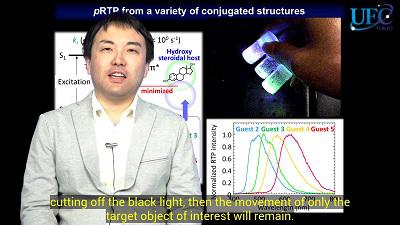December 2018 Issue
Researcher Video Profiles
Shuzo Hirata, Assistant Professor, Graduate School of Informatics and Engineering

Shuzo Hirata is using molecules for the development of materials that show new types of luminescence and absorption. The absorption of light by a molecule results in the formation of an electron-hole pair inside it. This is referred to as the excited state of the molecule. Usually the lifetime of this excited state is as short as 1 ms or less, but he has succeeded in increasing this to more than one second.
Some molecular materials that exhibit such long excited states are those that continue to emit light for a while after turning off the black light (UV light). If such a materials are attached to a target, then even if there are other luminescent impurities around it, if only the long luminescence remaining after cutting off the black light is followed, then the movement of only the target object of interest will remain. These techniques can be applied to highly sensitive sensors and high contrast bio-imaging.
Also, some materials that exhibit such a long excited state lifetimes include materials that become darker as their surroundings become brighter. Application of this technology include sun glass-type materials that become darker when their surroundings become lighter.
Hirata's research also includes improving the performance of such materials. But he is also carrying out wide ranging calculations, organic synthesis, and measurements to search for other interesting materials that exhibit interesting luminescent and absorption functions.
Further information
Shuzo Hirata
Assistant Professor, Graduate School of Informatics and Engineering, The University of Electro-Communications, Tokyo.
Website: http://kjk.office.uec.ac.jp/Profiles/74/0007342/prof_e.html
Research Highlight: Molecular materials with ultralong-lived room-temperature triplet excitons: Persistent room-temperature phosphorescence and nonlinear optical characteristics under continuous irradiance


